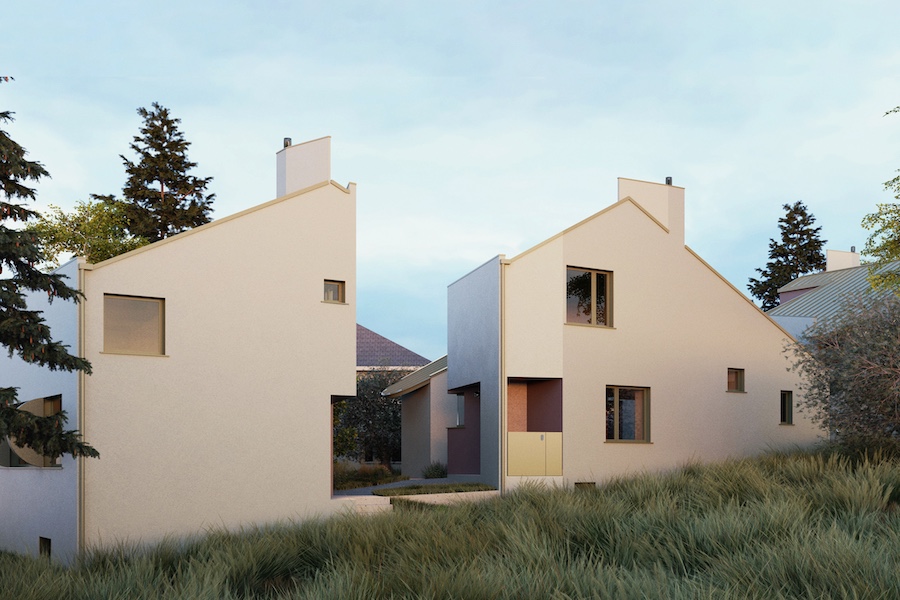Shake Shack returns its $10 million small business loan, hotels will undergo design changes in a post-pandemic world, and Milan residents return to the streets. All this and more in this week’s Five.
Precht proposes park designed for social distancing

Austrian design studio Precht has unveiled renderings of a maze-like park conceived to divide visitors via tall hedges. According to Dezeen, the concept, known as Parc de la Distance, will promote ongoing social distancing practices as spaces gradually reopen to the public in the coming months. The project is also imagined for a vacant plot in Vienna, where numerous parks remain shuttered. The park, whose form is reminiscent of a fingerprint shape, is lined with red granite gravel and clad with gates to indicate various entrances and exits for available routes. Precht estimates that a journey through the labyrinth-style park would take the average walker roughly 20 minutes to complete.
Forecasting the post-pandemic design vernacular

The built environment may undergo a return to modernism following the COVID-19 pandemic crisis. An article in Slate this week recalls the transition into a modern vernacular in the early 20th century after cities endured both the Spanish Flu and numerous tuberculosis outbreaks in cities like New York. Purity of form not only comprises strict geometries and a lack of ornamentation, but also smooth surfaces and lightweight, washable materials deprive dust and insects of hiding places.
A greater emphasis on sustainable urban design could also be heralded, with abundant outdoor spaces that establish ample exposure to light, air, and nature. The combination of modern and sustainable sensibilities could lead to a reduction in litter, pollution, and overcrowding in already-dense sprawls that would ultimately support healthier lifestyle.
Marriott launches new cleanliness council

A new council formed by Marriott International will pool input from in-house leaderships as well experts in numerous fields ranging from food safety to sustainability. Helmed by Marriott exec Ray Bennett, the council will aim to enhance cleanliness standards as well as occupational health, engineering, and associate wellbeing. The company will introduce new technologies including electrostatic sprayers equipped with hospital-grade disinfectants to sanitize surfaces. Ultraviolet light technology will also be used to sanitize keys and other devices shared by guests.
Marriott is one of many hotel companies rethinking hotel stays in light of COVID-19. A recent NBC News story speculated that hotels may no longer include breakfast buffets and minibars. Further changes include the influx of digital keys via mobile phones, no touch points throughout guests entire hotel stay, revised deep cleaning techniques for rooms, and guests signing up for specific time slots in hotel gyms.
Shake Shack returns $10 million loan

Danny Meyer’s fast-casual behemoth Shake Shack announced this week that it would return the $10 million small business loan it received from the U.S. government as part of the COVID-19 stimulus bill. Eater NY reports that Meyer posted on his LinkedIn page that the burger chain would return the loan “so that those restaurants who need it most can get it now.”
Shake Shack was among one of a handful chain eateries to receive emergency funding in the stimulus package that also received criticism from the public on social media. The company’s CEO Randy Garutti, who co-wrote Meyer’s post on LinkedIn, explains that the application for the loan was conducted out of an effort to keep thousands employed and rehire furloughed staff. Moreover, Garutti says that the guidelines for the loan were also unclear, insofar as it was open to restaurants with less than 500 workers in one location. Shake Shack, which operates 280 U.S. locations and netted more than $570 million in sales in 2019, has estimated a weekly loss of $1.5 million since COVID-19 hit the U.S.
Milan residents return to the streets

Following nearly two months of intense lockdowns and overwhelming tragedy, Italy has begun to ease quarantine mandates in parts of the country. The city of Milan has announced the launch of its “open streets” plan, which will favor pedestrian and bicycle travel over cars. The plan will repurpose more than 20 miles of roads throughout Italy’s Lombardy region over the course of the coming summer. ArchDaily reports that the plan for pedestrian streets will be initiated beginning in May, with the 3.7-mile stretch of Corso Buenos Aires in Milan serving as a key thoroughfare. The plan will not only aim to diminish street congestion but will also support efforts to maintain similar levels of low traffic and pollution in the city since the beginning of the lockdown.



